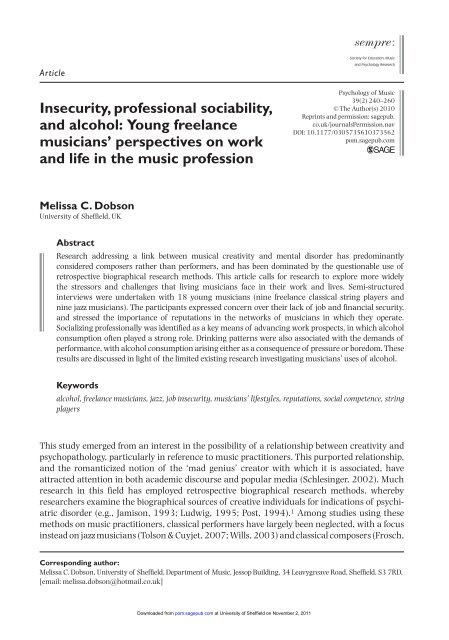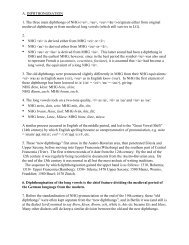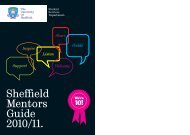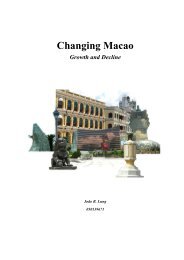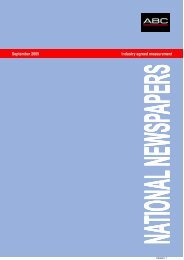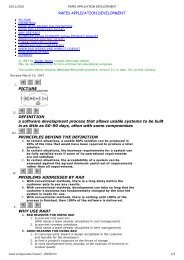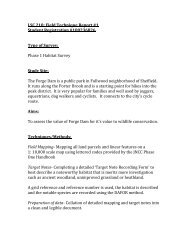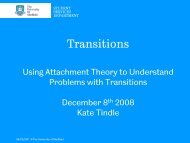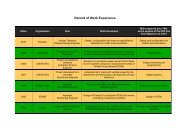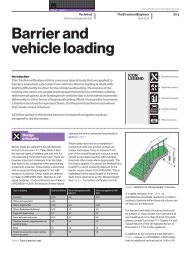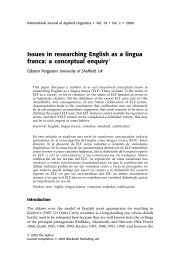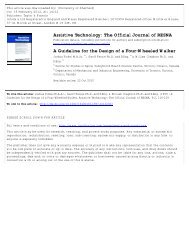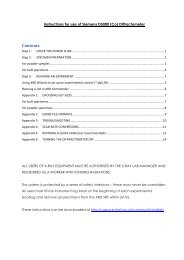Dobson, 2010.pdf - University of Sheffield
Dobson, 2010.pdf - University of Sheffield
Dobson, 2010.pdf - University of Sheffield
Create successful ePaper yourself
Turn your PDF publications into a flip-book with our unique Google optimized e-Paper software.
Article<br />
Insecurity, pr<strong>of</strong>essional sociability,<br />
and alcohol: Young freelance<br />
musicians’ perspectives on work<br />
and life in the music pr<strong>of</strong>ession<br />
Melissa C. <strong>Dobson</strong><br />
<strong>University</strong> <strong>of</strong> <strong>Sheffield</strong>, UK<br />
Psychology <strong>of</strong> Music<br />
39(2) 240–260<br />
© The Author(s) 2010<br />
Reprints and permission: sagepub.<br />
co.uk/journalsPermission.nav<br />
DOI: 10.1177/0305735610373562<br />
pom.sagepub.com<br />
Abstract<br />
Research addressing a link between musical creativity and mental disorder has predominantly<br />
considered composers rather than performers, and has been dominated by the questionable use <strong>of</strong><br />
retrospective biographical research methods. This article calls for research to explore more widely<br />
the stressors and challenges that living musicians face in their work and lives. Semi-structured<br />
interviews were undertaken with 18 young musicians (nine freelance classical string players and<br />
nine jazz musicians). The participants expressed concern over their lack <strong>of</strong> job and financial security,<br />
and stressed the importance <strong>of</strong> reputations in the networks <strong>of</strong> musicians in which they operate.<br />
Socializing pr<strong>of</strong>essionally was identified as a key means <strong>of</strong> advancing work prospects, in which alcohol<br />
consumption <strong>of</strong>ten played a strong role. Drinking patterns were also associated with the demands <strong>of</strong><br />
performance, with alcohol consumption arising either as a consequence <strong>of</strong> pressure or boredom. These<br />
results are discussed in light <strong>of</strong> the limited existing research investigating musicians’ uses <strong>of</strong> alcohol.<br />
Keywords<br />
alcohol, freelance musicians, jazz, job insecurity, musicians’ lifestyles, reputations, social competence, string<br />
players<br />
This study emerged from an interest in the possibility <strong>of</strong> a relationship between creativity and<br />
psychopathology, particularly in reference to music practitioners. This purported relationship,<br />
and the romanticized notion <strong>of</strong> the ‘mad genius’ creator with which it is associated, have<br />
attracted attention in both academic discourse and popular media (Schlesinger, 2002). Much<br />
research in this field has employed retrospective biographical research methods, whereby<br />
researchers examine the biographical sources <strong>of</strong> creative individuals for indications <strong>of</strong> psychiatric<br />
disorder (e.g., Jamison, 1993; Ludwig, 1995; Post, 1994). 1 Among studies using these<br />
methods on music practitioners, classical performers have largely been neglected, with a focus<br />
instead on jazz musicians (Tolson & Cuyjet, 2007; Wills, 2003) and classical composers (Frosch,<br />
Corresponding author:<br />
Melissa C. <strong>Dobson</strong>, <strong>University</strong> <strong>of</strong> <strong>Sheffield</strong>, Department <strong>of</strong> Music, Jessop Building, 34 Leavygreave Road, <strong>Sheffield</strong>, S3 7RD.<br />
[email: melissa.dobson@hotmail.co.uk]<br />
Downloaded from<br />
pom.sagepub.com at <strong>University</strong> <strong>of</strong> <strong>Sheffield</strong> on November 2, 2011


